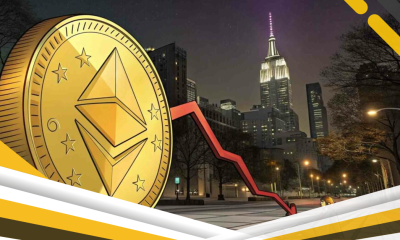Trump Maldives Resort: Invest Early with Blockchain Tokens

A new era for real estate investment is dawning as The Trump Organization, in partnership with London-listed luxury developer Dar Global, has unveiled plans for the Trump International Hotel Maldives. This ambitious project not only marks the Trump brand’s entry into one of the world’s most exclusive tourism markets but also introduces a groundbreaking financing model: the tokenization of a luxury hotel development project during its construction phase, allowing investors to buy in before it is built.
A New Frontier in Real Estate: Tokenizing the Trump International Hotel Maldives
The Trump International Hotel Maldives is envisioned as an ultra-luxury retreat, featuring approximately 80 exclusive beach and overwater villas. Situated a mere 25-minute speedboat ride from Malé, the Maldivian capital, the resort is designed to cater to discerning global travelers seeking privacy, exclusivity, and sophistication.
What sets this development apart is its innovative approach to funding and ownership. Unlike traditional real estate tokenization models that typically fractionalize ownership in completed properties, this initiative tokenizes the development stage itself. This allows investors to acquire digital tokens representing stakes in the project from its inception, opening new avenues for participation in premium hospitality developments.
Eric Trump, Executive Vice President of The Trump Organization, expressed enthusiasm for the venture, stating that the development aims to “redefine luxury in the region” and establish “a new benchmark for innovation in real estate investment through tokenization.” Ziad El Chaar, CEO of Dar Global, echoed this sentiment, highlighting that tokenizing the Trump International Hotel Maldives represents a “global first” that integrates luxury, innovation, and technology to transform real estate investment.
The resort is projected to open its doors by the end of 2028.
The Broader Landscape of Tokenized Real-World Assets
The launch of the Trump International Hotel Maldives’ tokenized development aligns with a rapidly expanding global interest in real-world asset (RWA) tokenization. This sector involves converting tangible assets, such as property, into digital tokens on a blockchain, enabling fractional ownership and potentially enhancing liquidity through 24/7 trading.
The market for tokenized real estate is experiencing significant growth. Forecasts suggest that tokenized real estate assets could surpass $10 billion in value as of 2025, with some analysts estimating it could reach $3 trillion by 2030, potentially representing about 15% of real estate assets under management worldwide. Institutional investor interest is notable, with many either currently investing in or planning to allocate funds to tokenized assets, citing real estate as a particularly attractive asset class.

Trump Organization’s Expanding Digital Footprint
The Trump Organization has been increasingly engaging with blockchain technology and digital assets. This includes previous collaborations with Dar Global on other projects, such as Trump Towers in Jeddah and Dubai, and resorts and golf courses in Qatar and Oman. In a notable move, the $1 billion Trump International Hotel and Tower in Dubai announced it would accept cryptocurrency payments for property sales. Eric Trump indicated strong belief in cryptocurrency as “the financial mechanism of the future,” with apartment prices in the Dubai tower starting around $1 million and penthouses reaching over $20 million.
Beyond luxury real estate, the Trump family’s digital expansion has also included ventures in NFTs, memecoins, and the development of a real estate-themed blockchain game.
Global Momentum for Tokenized Finance and Real Estate
The adoption of tokenization extends beyond private real estate developments. Financial authorities globally are actively exploring and implementing tokenized finance initiatives:
- **Dubai’s Pioneering Role**: Dubai has positioned itself as a hub for digital asset activity. The Dubai Land Department (DLD) and the Virtual Assets Regulatory Authority (VARA) launched PRYPCO Mint, a government-backed tokenized real estate platform. This platform aims to democratize real estate investment, allowing fractional ownership of Dubai properties with minimum investments as low as AED 2,000 (approximately $545). The DLD estimates tokenized real estate could comprise 7% of Dubai’s property market by 2033, reaching roughly AED 60 billion (approximately $16 billion).
- **Singapore’s Central Bank Initiatives**: The Monetary Authority of Singapore (MAS) is preparing a pilot for tokenized government bills to be settled using a wholesale central bank digital currency (CBDC) in 2026. This move signifies that tokenization has progressed beyond the experimental phase and is being integrated into real-world financial systems, with the goal of making finance faster and more efficient.
- **Europe’s DLT Pilot Regime**: Europe is also exploring the potential of tokenization for capital markets through its Distributed Ledger Technology (DLT) Pilot Regime. This framework allows for temporary exemptions to certain securities regulations to facilitate the issuance, trading, and settlement of tokenized securities, including shares and bonds.
Institutional interest in tokenized assets is on the rise. A 2025 State Street study revealed that a majority of institutional investors expect their digital asset exposure to double within three years, with over half anticipating that 10-24% of institutional investments will be tokenized by 2030. Private markets, particularly private equity and fixed income, are identified as key areas for tokenization, driven by the desire to unlock liquidity and efficiency in traditionally illiquid assets.
Conclusion
The Trump International Hotel Maldives project, with its innovative tokenization of the development phase, serves as a significant case study in the evolving intersection of luxury real estate and blockchain technology. This approach could democratize access to high-end investments and provide developers with new capital-raising avenues. As financial institutions and governments worldwide continue to explore and embrace tokenized assets, this venture highlights a growing trend towards more flexible, accessible, and potentially liquid investment opportunities in the global real estate market.












